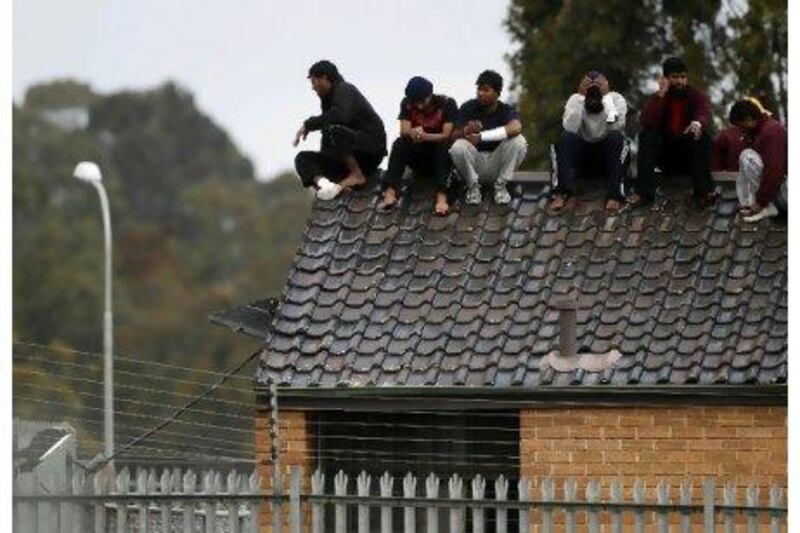SYDNEY // Black smoke rising into the sky above the Villawood immigration detention centre this week seemed to symbolise the despair of those incarcerated within.
On Monday night, a soft-spoken Iraqi named Ahmad al Akabi hanged himself in a bathroom, after his application for asylum in Australia was rejected. It was the second suicide in less than two months at the facility, following that of Josefa Rauluni, a Fijian, who leapt off a building hours before he was due to be deported.
Al Akabi's death sparked a two-day hunger strike at the centre, in Sydney's sprawling western suburbs. Fellow detainees also staged a rooftop protest, and set a mattress and chairs alight outside the accommodation blocks. But as dozens of police were deployed to guard the camp perimeter, hopelessness rather than anger characterised the mood inside.
The tragedy highlighted Australia's treatment of asylum-seekers, who are automatically locked up if they arrive by boat. A mental health expert, Prof Patrick McGorry of the University of Melbourne, has described the detention centres as "factories for producing mental illness".
Al Akabi, 41, from the southern Iraqi city of Karbala, had been suffering from depression, and friends at Villawood were "watching him 24 hours a day, following him everywhere", according to Jamal Daoud, of the Social Justice Network, an advocacy group.
On Monday, al Akabi got up from a game of cards, saying he was going outside for a cigarette. When he failed to return, friends began searching for him. "We found the bathroom locked, knocked on the door, nobody answered," said a fellow Iraqi asylum-seeker, who asked not to be named. Climbing onto a window ledge, they discovered that he had hanged himself, using the drawstring cord from his shorts.
A teacher and truck driver who had a wife and three young daughters, al Akabi had left Iraq after being threatened by two militia groups, the Mahdi Army and the Badr Brigades. Following a boat journey via Indonesia - the customary route of asylum-seekers - he was picked up in Australian waters and taken to an immigration facility on Christmas Island, an external territory in the Indian Ocean, for processing.
That was nearly a year ago; by April his asylum application had been rejected, along with an appeal. Transferred to Villawood in preparation for being deported, he was still there seven months later, despite agreeing to return home voluntarily.
The delay was because al Akabi changed his mind, the immigration minister, Chris Bowen, said this week. His friends deny that.
"He was desperate to go home," Mr Daoud said. "His family was pushing for him to come back. He felt like he had abandoned his wife and daughters. The family is very poor, and they couldn't support themselves."
His suicide - coming so soon after that of the 36-year-old Rauluni - has raised questions about mental health care in detention centres. Authorities have refused to discuss details of al Akabi's case, other than to say he had been seeing a psychiatrist, but according to his roommate he had made several previous attempts to kill himself. Once he had drunk bleach, the room-mate said; another time he had swallowed 40 anti-depression tablets.
Mr Bowen has announced a coroner's inquiry, and George Newhouse, a human rights lawyer acting for al Akabi's widow, said it should be widened "to investigate the systemic failures that have led to two deaths in immigration detention in as many months".
While the Labor government, first under Kevin Rudd and now Julia Gillard, has abolished some of Australia's harsher refugee policies, it is determined to maintain a hard line on so-called "boat people". The numbers arriving by sea have risen steeply, to more than 5,000 so far this year, compared with 161 during 2008.
Offshore processing - a central plank of government policy since 2001 - takes place on Christmas Island, but with the place now swamped, Ms Gillard wants to establish a new regional centre, possibly in neighbouring East Timor. However, the future of the policy is in doubt following a High Court decision last week, which questioned the legality of denying offshore detainees access to Australian courts.
The ruling opened the way for thousands of unsuccessful asylum-seekers to appeal - an avenue of which al Akabi was aware, according to his fellow Iraqi. But he was "very tired, very depressed", the friend said, adding: "He had lost hope. He told me, if I make another appeal, they'll just reject me again."
Thanks to overcrowding, and longer processing times, tensions are high in many detention facilities. On Christmas Island, 250 people entered the third day of a hunger strike yesterday, with 10 of them sewing their lips together. Camps in Darwin and Melbourne have also witnessed unrest recently.
At Villawood, a cluster of squat brick buildings surrounded by a tall metal fence, the situation remains volatile. After visiting detainees this week, Lee Rhiannon, a Greens politician, said: "The anguish that is within this centre at the moment is extreme. There are people who are so traumatised they can't speak."
Among those attending a protest rally on Wednesday was Iraj Moghadam, who spent 10 months incarcerated with al Akabi. Mr Moghadam, since granted refugee status, said: "He was fine when he first came into the detention centre, and like everybody else, his situation deteriorated."
The despair that drove al Akabi to take his own life is shared by many at Villawood. His Iraqi friend said: "You're don't know the future, you're just waiting. And you can't sleep at night, always thinking about your family. Every day we become sick, we become crazy, we become depressed, and we feel nobody cares about us."
[ foreign.desk@thenational.ae ]





